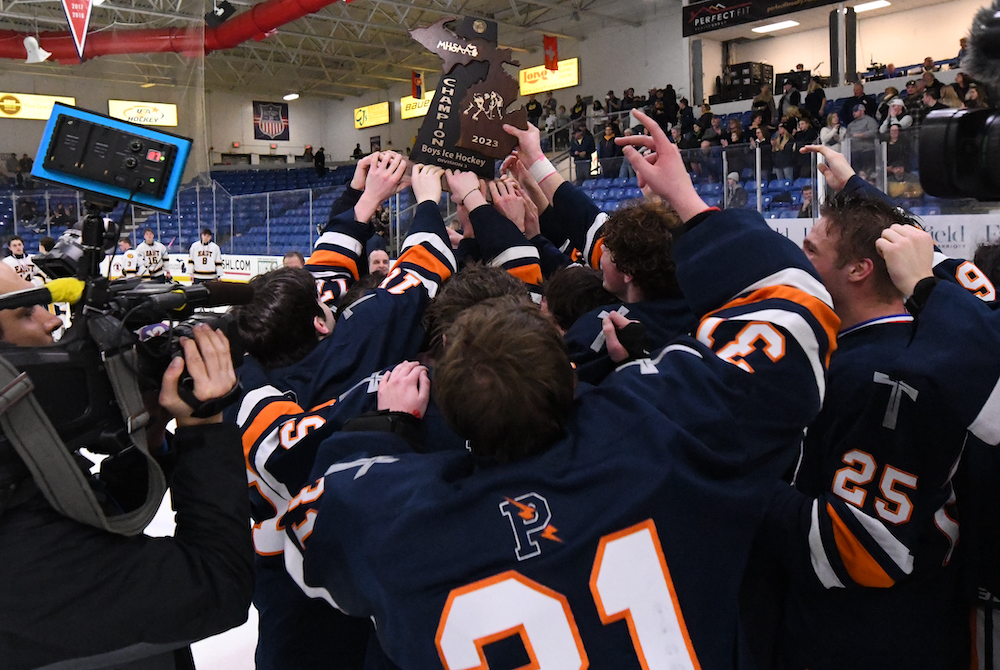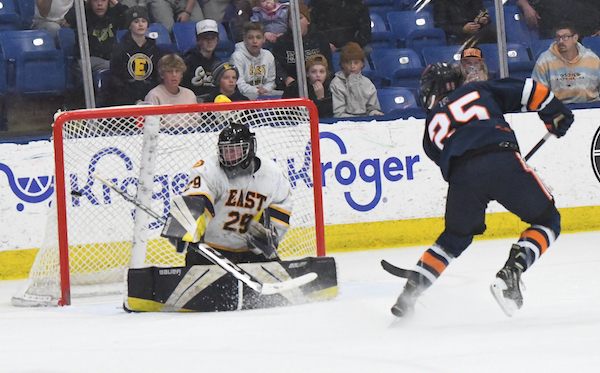
Near-Miss Memories Can Fade as Flint Powers Catholic Claims 1st Hockey Title
March 11, 2023
PLYMOUTH — How far back do Flint Powers Catholic seniors Mason Czarnecki and Cooper Gerhardt go in their hockey careers together?
About as far back as you can go in the sport.
“We’ve played since day one,” Czarnecki said. “I think we were pushing the chair around together.”
From humble beginnings playing house league with the Flint Icelanders at Flint Iceland Arenas to their days winning travel hockey state championships with the Flint Junior Firebirds, Czarnecki and Gerhardt developed a connection that few teammates possess.
That bond came in really handy in the final seconds of the MHSAA Division 3 championship game Saturday at USA Hockey Arena.
Following a faceoff in the Powers zone, Gerhardt got the puck and spotted Czarnecki taking off through the neutral zone. Gerhardt sent him a perfect outlet pass, springing Czarnecki on a breakaway … and into history.
Czarnecki scored on that breakaway with only 4.6 seconds left on the clock, giving the Chargers their first championship in their eighth Finals appearance with a 3-2 victory over East Grand Rapids.
It was the latest game-winning goal in regulation time in Finals history, eclipsing Alex Hamady’s goal with 6.7 seconds left for Bloomfield Hills Brother Rice to beat Byron Center in a Division 2 Final two years ago.
“The ref dropped the puck and the puck was just sitting there,” Gerhardt said. “I looked up and (Czarnecki) was just flying down the ice. There’s a gap between the two ‘D.’ I just threw it and hoped for the best.
“The rest is history.”
And the ultimate memory to strengthen the bond between two great friends.
“For him to give me that pass on the big stage and to make it happen with four seconds left, I’m in awe right now,” said Czarnecki, who scored 30 goals this season and 64 during his three-year career. “This is crazy. I’ll remember this for the rest of our lives.”
 It was not only the first championship for Powers, but the first for a Genesee County school after five had lost in the Finals.
It was not only the first championship for Powers, but the first for a Genesee County school after five had lost in the Finals.
Travis Perry coached Powers teams that reached the Finals before, losing 1-0 in overtime to Calumet in 2008 and 3-1 to Bloomfield Hills Cranbrook Kingswood in 2010. He had a 27-1 team lose in the Semifinals in 2017.
He wondered if this day would ever arrive.
“It’s been 17 years that I’ve had a lot of great players,” said Perry, who played for Powers. “It’s been 50 years of just struggles, be it bad bounces, we’ve had bad games down here. It’s 50 years of frustration that came off, so it’s great to see.”
It’s never been easy when Powers has reached the Finals, going all the way back to a 6-2 loss to Houghton in 1982 in the hometown at IMA Sports Arena.
So, even though the Chargers took control with an early 2-0 lead against East Grand Rapids, the historic championship was going to put Powers and its fans through the emotional wringer.
Czarnecki and Brody Neelands scored to give Powers a 2-0 lead in the first 14 minutes, 6 seconds, but East Grand Rapids goalie Austin Stankowski then shut out the Chargers until the final seconds.
Tyler Sikkenga, whose goal in the final seconds forced overtime in a 2-1 upset of No. 1-ranked Houghton in the Semifinals, scored at 2:29 of the second period and 9:00 of the third to tie the game.
Then, for once, the most important bounce went Powers’ way.
“These guys have played together their whole lives,” Perry said. “That’s part of it, too. Mason takes off and knows Coop’s gonna get him the puck. We score, half the team is crying; we’re out of sorts. We still have five seconds left. I’m trying to get everybody under control. I think I was a little out of sorts. Obviously, we were able to close it out. It’s hard to put into words what it feels like right now.”
The victory came one year after a 3-2 loss to eventual Division 3 champion Midland Dow in a Regional championship game, one of the few years in which Powers didn’t win a Regional. The Chargers have won 35 Regionals, second in MHSAA history only to the 38 won by 14-time Finals champion Trenton.
“I actually printed out a picture of the scoreboard,” Powers senior Greg Feamster said. “Every morning, I’d wake up and look at that picture and think about how it felt. So, every day just working out, working with the team practices, I think of that moment. The seniors know what it felt like. It really pushed us and allowed us to get over that hump.”
East Grand Rapids was also on a quest to make history, having lost 3-2 to Dearborn Divine Child in its only Finals trip in 2002.
This wasn’t a Pioneers team that looked like a candidate to play on the final day of the season, having gone 10-11-2 during the regular season. But East Grand Rapids beat No. 6 Grand Rapids Catholic Central in the Regional Final, No. 7 Bay Reps in the Quarterfinals and then pulled off the ultimate upset over No. 1 Houghton in the Semifinals to reach the championship game.
An unranked team that wasn’t on anyone’s radar to win Division 3 was within one shot of doing so.
“That’s something we’ll hang our hat on a little bit later,” East Grand Rapids coach Christopher Newton said. “Obviously, this one stings. But we proved this weekend we can play with some of the best teams in the state. I’m proud of our kids. They left everything out there. They have nothing to be ashamed of.”
Nicholas Kurtiak turned aside 23 of 25 shots for Powers, while Stankowski stopped 24 of 27.
PHOTOS (Top) Flint Powers Catholic celebrates its first Finals championship Saturday at USA Hockey Arena. (Middle) The Chargers’ Mason Czarnecki (25) sends home the winning goal.
State Champs! Network: 2023 Ice Hockey Finals Highlights
March 29, 2023
Join Jonathon Kidd and Sean Baligian as we take a look at all of the action from the 2023 Hockey State Finals
Congratulations to our State Champions
Division 1 - Detroit Catholic Central
Division 2 - Brother Rice
Division 3 - Flint Powers

